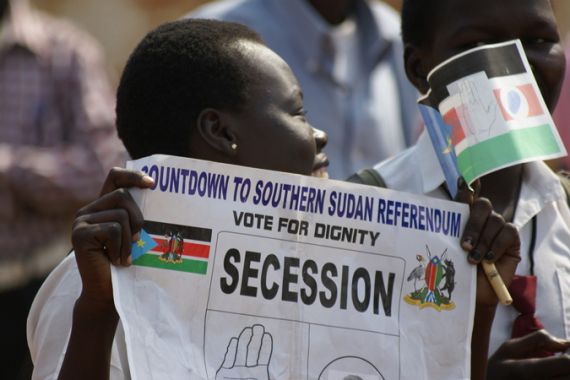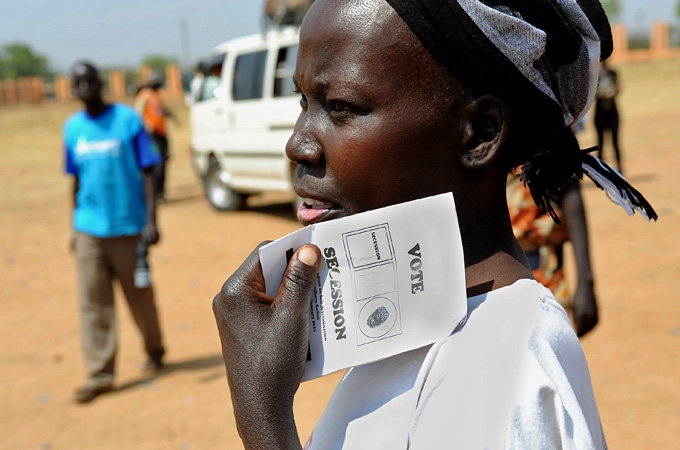Deadly clashes ahead of Sudan vote
At least 7 people feared dead in unrest involving south Sudan security forces in the run-up to referendum on secession.

 |
| The referendum is widely expected to result in Independence for the south [EPA] |
At least seven people have been killed in clashes involving south Sudan security forces in the run-up to the referendum in which southerners are to vote on whether to split from the north.
Six people were killed in fighting between south Sudan’s army and a pro-Khartoum militia in Unity state and another person died in clashes between the Misseriya tribe and police in the disputed Abyei region.
Earlier reports on Saturday had said 19 people had been killed in Abyei, the border region which is claimed by both the north and the south, but Al Jazeera could only confirm one of the deaths.
Al Jazeera’s Mohammed Vall, reporting from Muglad, cited a spokesman for the Sudan People’s Liberation Movement (SPLM) which governs the south, as saying the unrest in Abyei had started on Friday and involved the Misseriya tribe, which is loyal to the Khartoum government.
“According to the spokesman, it was Misseriya armed men who opened fire on a group of policemen from SPLM,” he said.
“Those clashes were renewed today and according to the same spokesman, both parties used some heavy weapons.
“Also, we spoke to a spokesman on the Misseriya side and he had a different story. He said it was SPLM policemen who opened fire on Misseriya shepherds.”
Deng Arop Kuol, Abyei’s chief administrator said “unknown gunmen” had attacked civilians in the Makeir area.
“Several civilians were killed,” he said.
‘Disrupting the referendum’
Philip Aguer, a spokesman for south Sudan’s army, the SPLA, said earlier on Saturday that his forces had killed six people in clashes with fighters loyal to Galwak Gai, a militia leader, in Unity state.
“They were coming from the north to disrupt the referendum. It is a known game. The spoilers are always here. They definitely came from Khartoum,” he said.
Gier Chuong, south Sudan’s internal affairs minister, blamed the Abyei violence on members of the Misseriya tribe along with “elements that are unknown”.
“It is believed that some of them have been putting on uniforms and clashing with the police around Abyei this afternoon,” he said.
“Possibly they claim to be Misseriya but are supported by Janjiwid,” he said referring to the pro-government predominantly-Arab militia which supports the Khartoum government.
Chuong said that the violence was being instigated by “elements that are looking to undermine the south and interfere with the voting”.
Southern leaders have regularly accused north Sudan of backing militias in an attempt to disrupt the referendum on whether the south should secede. Northern leaders have dismissed the accusations.
‘Ready for secession’
Earlier this week, SPLA commanders said they are well equipped to deal with any situation that may arise after the referendum, including an attack from the north.
The governor of the Upper Nile state at the border between north and south told Al Jazeera that secession should be peaceful, but that any northern aggression would be met with force.
“What do we do, we fight. We don’t want to fight but we have the capacity to protect ourselves and to defend and our territory,” Simon Kuon Pouch said.
Speaking to Al Jazeera on Friday, Omar al-Bashir, the Sudanese president, said he was concerned about possible instability in the south following the vote.
“The stability of the south is very important to us because any instability in the south will have an impact on the north. If there is a war in your neighbour’s house, you will not be at peace,” he said.
“The south suffers from many problems. It’s been at war since 1959. The south does not have the ability to provide for its citizens or create a state or authority.”
‘Peaceful co-existence’
However, Salva Kiir, the south Sudanese president, said on Saturday that an independent south would be peaceful and work with its northern neighbours.
“Today there is no return to war,” he said.
“The referendum is not the end of the journey but rather the beginning of a new one,” he said alluding to the six-month transitional period to recognition as an independent state stipulated by the 2005 peace agreement between the Khartoum government and the former rebels in the south.
“There is no substitute for peaceful co-existence.”
Voting in the south starts on Sunday and will continue for seven days.